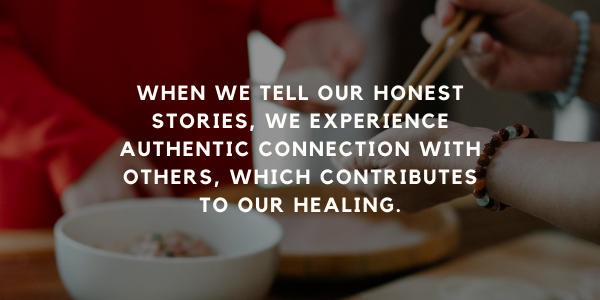Dim Sum Stories
- Jul 29, 2025
- 4 min read
Storytelling - our own - can bring healing. Jenn Suen Chen shares how.
Elisa

Dim Sum Stories
By Jenn Suen Chen
A round yellow Formica table with a swiveling center in my childhood home remains an essential part of my memory. It represents all things family. Dinners were always together. My mother served whole, freshly steamed fish topped with finely julienned ginger and green onions sizzling in hot oil, fragrant pearl-white jasmine rice, and fresh stir-fried vegetables packed with ginger. I can hardly remember a night when we weren’t all around the table.
My least favorite dinner, I must confess, was steamed fish. Tiny bones that got lodged in my throat left me unable to concentrate on homework all night. What’s more, the house would smell of fish for days. When I invited my friends over for dinner, I prayed it would not be a steamed fish kind of night.
Actually, I was nervous inviting friends over if it was an any-kind-of-Chinese-food night. I remember the horrified look on my mother’s face when my friend requested butter for her rice.
Awkward moments like these highlighted what felt like a chasm between the cultures I was navigating, and I felt like a tiny bridge holding them together.
Weekend dim sum meals with friends and family, however, were the best. I didn’t have to explain this meal to anyone around the table. This was our space. All our family’s favorite restaurants were in Chinatown, and the owners and staff knew our family.
It is difficult to adequately explain to others just how important good food is to an immigrant Asian family. Food reminded my parents of the home they had left and anchored us in our culture as a family. While the adults caught up around the table, we kids read books and entertained ourselves until the long meal was over.
Unlike the previous generations, my parents shared a mutual deep faith in God, which framed our family’s values and practices. This involved praying together as a family at the close of every evening.
My conversations with God as a six-year-old included consistent requests for him to change my straight black hair into curly blond hair and to exchange my small, brown Asian eyes for big, blue round ones like those of my friends. I spent a lot of time practicing those big eyes in front of the bathroom mirror, but I still endured the merciless teasing of the boys on the playground as they made fun of my height, my small Asian eyes, my flat nose, and anything else about me they could think of. I tried to laugh it off, run away, or find refuge in the classroom with my teachers.
We Each Have A Story
You and I have a story that began long before we were born. In Psalm 139:15‑16, the psalmist writes, “You watched me as I was being formed in utter seclusion, as I was woven together in the dark of the womb. You saw me before I was born. Every day of my life was recorded in your book. Every moment was laid out before a single day had passed.”
When we are young, we cannot understand the full reality of our family structure and dynamics, our cultural environment, and the various communities we live in. Most of us can only find our way through it. We become really good at adapting on our own, even if we know God. We also find ways to numb our pain.
God invites us now to untangle those ways and discover and acknowledge his faithful hand that has been over us for all our years.
Why Delve Into Our Stories?
You may be wondering, That’s nice, Jenn. I’m happy you have some fun stories to recall. But what’s the point of recounting our stories, anyway?
I will venture to say if we want deep healing, then we must do the work.
We have all told our stories in a thousand ways, whether explicitly or implicitly. We have all believed a narrative about our lives, about who we are, about how we should interact with others, and about who God is—and all of it is deeply informed by our stories. Some of this shaping is good, but many of our stories have left deep wounds that have never healed.
My heavily fortified, self-reliant heart that emerged from my early elementary school years kept me from truly showing up in relationships until I was able to identify and tell my story in a fuller, more honest way. I’m still learning to do that, and God is healing my heart.
I believe healing and connection are two big reasons why we do this work. When we tell our honest, unmasked stories to one another, we experience authentic connection with others, which contributes to our healing. Telling our stories also helps us to make sense of our lives.
Taken from Dim Sum and Faith by Jenn Suen Chen. Copyright (c) 2025 by Jennifer Chen. Used by permission of InterVarsity Press. www.ivpress.com

Jenn Suen Chen is a spiritual director, speaker, and leader in the area of spiritual formation and crosscultural ministry. She is the author of Dim Sum and Faith. She is codirector of Summit Clear (with her husband, John), an organization focused on providing spiritual direction, mentoring, and leadership coaching for those in crosscultural work. She serves with Pioneers and spent twenty-five years living in Asia raising her family. Jenn and John have four adult children and live in the Pacific Northwest.



Growing up, I can relate to those family meals filled with both love and a few dishes I didn’t enjoy. It’s funny how food shapes our memories. Nowadays, while searching for everyday conveniences like free vending machines near me, I’m reminded how sharing meals—no matter the menu—always brought connection and comfort in its own way.